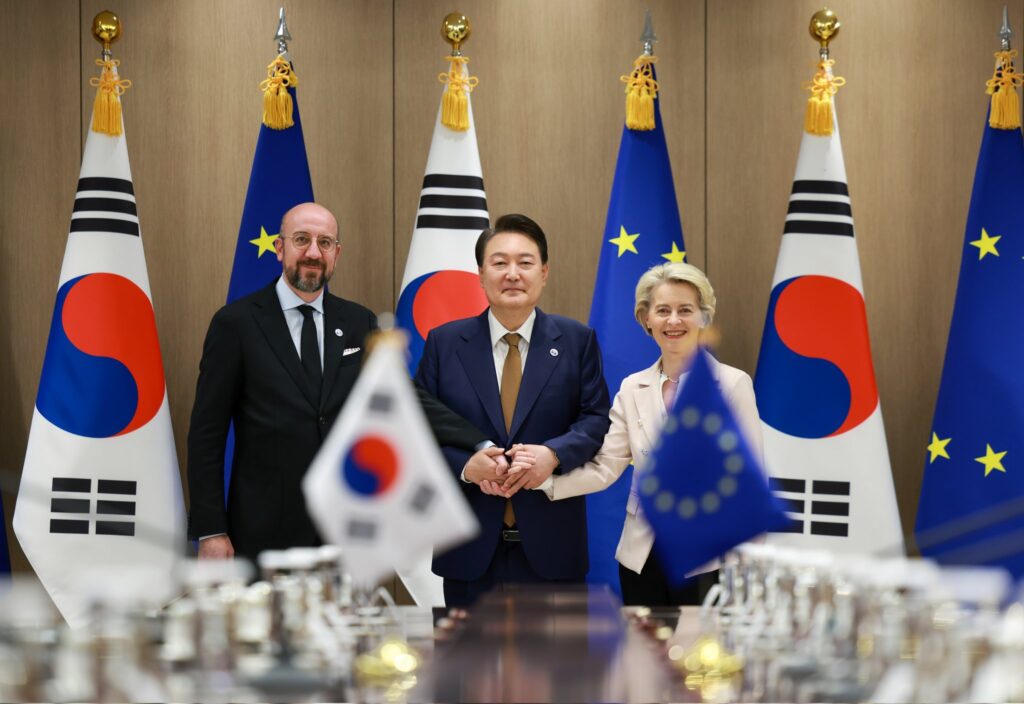The Peninsula
The ROK-EU Summit: One Cog in a New Multilateral Machinery

A remarkably detailed joint statement emerged from the May 22, 2023, summit meeting in Seoul between President Yoon Suk Yeol and European Commission President Ursula von der Leyen and European Council President Charles Michel–the twin leadership of the EU. The statement noted the 60th anniversary of diplomatic relations between the EU and ROK; described common principles and common concerns; and pledged increased cooperation in old areas, such as the EU-ROK Free Trade Agreement, and new ones, such as the EU-ROK Digital Partnership and the EU-ROK Green Partnership.
But, as detailed as the EU-ROK Joint Statement is, it appears to be but one chapter of a synoptic volume of documents that were published in April and May of 2023: the U.S.-ROK Leaders’ Joint Statement from President Yoon’s state visit to Washington (April 23); G7 Leaders’ Statement on Ukraine (May 19); G7 Hiroshima Leaders’ Communique (May 20); Quad Leaders Joint Statement (May 20); and the Joint Statement of the European Union-Republic of Korea Summit (May 22). Depending which font you pick, this amounts to around one hundred pages of principles, perspectives, and action plans that are very much in tune, representing the common voice of a group of countries: the US, EU, UK, Canada, Korea, Japan, and Australia.
There is no name for this group, but its membership is clearly that of countries that are leading democracies, free market economies, and technological powerhouses. Calling it “the West” is anachronistic because of its Pacific membership. Not all the countries are members of the G7, and not all are members of NATO, but they all show up for meetings of those clubs. They find it important to work together and they all bring resources to the table. Most of all, it is a group that can act to advance its common interests as seen in the specificity of the May documents—a capacity that is sorely lacking in other international forums and organizations, particularly those with Russia and Chinese membership. Because we have to call the group something, for now let’s call it a “Fellowship,” avoiding words with a martial implication.
A fair question to ask is whether the very long (forty page) G7 Hiroshima Communique is a compendium of agreements already made by bilateral and multilateral groups within the Fellowship, or whether it is a source document that will provide a basis for cooperation among its members. Whichever way the language flowed; it reads as if the G7 Communique is an encyclopedic listing of policy areas which need to be followed up for action by members of the Fellowship. One indication that the G7 intends its communique to be a governing document is how differently it reads from previous G7 communiques. For example, the Joint Leaders’ Statement that emerged from the 2015 German-led G7 meeting is less than half the size of the Hiroshima Communique and was couched more as a description of global issues than as a plan to elaborate and implement.
Not every Fellowship country’s signature is on every document, of course. Korea’s only appears on the U.S.-ROK Leaders’ Joint Statement and the EU-ROK Joint Statement, but the mirroring of language from those two documents with that in the G7 Communique shows a general alignment.
The May 22 ROK-EU Joint Statement represents both a significant deepening of bilateral ties between Korea and EU and an implementation plan for parts of the Fellowship’s agenda as seen in the May 20 G7 Communique. The ROK-EU Joint Statement establishes a ministerial level “Strategic Dialogue” for the two countries; expands cooperation under the ROK-EU Digital Partnership; launches a Health Emergency Preparedness and Response system; calls for cooperation between the EU’s Coordinated Maritime Presence (CMP) in the Pacific with Korea’s Navy; continues cyber policy consultation; and promises cooperation on the regulation of AI, among many other policy areas. The EU offers Korea association with its €95 billion research and innovation program, Horizon Europe, as well as people-to-people participation in its Erasmus+ student exchange program. All of these activities fit within the framework of the G7 Hiroshima Communique.
Presidents Biden, Yoon, and Von der Leyen show a sense of urgency in seemingly wanting to make as much progress as quickly as possible, partly because the global challenges are already upon us, and partly to lay groundwork that might have a chance of surviving less companionable future political leadership. They will gather again at the NATO Vilnius Summit in July to see what can be done next.
Mark Tokola is the Vice President of the Korea Economic Institute of America. The views expressed here are his own.
Photo from @President_KR, the Twitter feed of South Korean President Yoon Suk Yeol.
